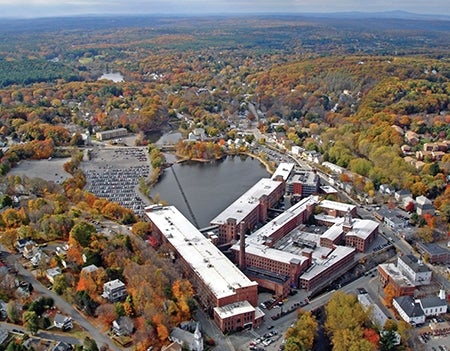Twenty-five years after the public debut of the World Wide Web, the internet is so ingrained in our daily lives that we hardly notice we’re using it. You can upload data for a client in China, log on to the company intranet from your phone while you’re on the road, or just sit at home watching Netflix. The only time you’re likely to even remember the system of cables and exchanges that makes modern communication possible is when something goes wrong.As the volume of data moving around the world grows, the companies that build the infrastructure of the internet are working very hard to keep things from going wrong. Helping them in that task is Acacia Communications, the seven-year-old Maynard company that went public in May with a $103.5-million initial public offering.
Murugesan “Raj” Shanmugaraj, Acacia’s president and CEO, said the products his firm makes, known as optical interconnects, are crucial for transmission of high volumes of data.
“The more capacity needs go up, the more complicated it is,” he said. “We are able to have more intelligence built into these optical interfaces.”
Acacia’s customers are big equipment manufacturers building the infrastructure of the modern internet, Shanmugaraj said. Right now, there are a few big trends driving the company’s sales: the growing demand for online video, increasing amounts of corporate and personal data being stored off-site through cloud providers and the expansion of data networks in the developing world, particularly China.
Mark Lutkowitz, a fiber optics industry consultant with the Tennessee firm FibeReality, said Acacia’s big selling point is its technology, which helps move large volumes of data cleanly.
“They happened to come up with this processor which provides capability that no other competitor so far has been able to approach,” Lutkowitz said. “That’s what really set them apart.”
Indeed, Acacia is a deeply technical company. According to the prospectus it released for its IPO, 105 of its 228 employees work in research and development, and nearly three quarters of them have backgrounds as engineers or in another technical field.
While a company with such a strong technical focus wouldn’t be out of place in Silicon Valley, Shanmugaraj said, Maynard has been a good place to do business. About three quarters of the company’s employees work at the headquarters in Clock Tower Place, with others in a New Jersey satellite office.
The company’s reputation has allowed it to attract workers from all over the world, but Shanmugaraj said it helps that there’s a strong base of technical expertise along the I-495 belt and in Boston and Central Massachusetts. For years, the region has been home to major technical companies and the highly educated workforce that goes with them.
“We’ve been able to tap into a lot of that talent,” he said.
So far, investors have been impressed with the company’s achievements. Its stock price has risen consistently since it went public in May, with a distinct leap in mid-August after it released second quarter results showing a 274-percent jump to quarterly revenues of $116.2 million and profits of $17.5 million.
Lutkowitz said it would be a mistake to overvalue Acacia based on its strong stock performance, which puts Acacia’s market cap at $4 billion, around 10 times its revenue. He said the firm may be doing extraordinarily well at the moment due to a combination of massive internet infrastructure construction happening in China and projects by companies like Facebook and Google, which are working to interconnect data centers.
There’s a bit of a mini-stock bubble in the optics industry that Acacia is part of, he said, and the company went public at the perfect time to take advantage of it.
The market for products like Acacia’s optical interconnects could drop at some point, Lutkowitz said, particularly after the Chinese projects are complete. Yet, the company’s underlying technology is still likely to put it in a good position in the years to come.
“These are really smart guys,” he said. “They’ll know that they need to be prepared for the time when things get back to normal.”
Shanmugaraj declined to speak about the company’s stock performance, but he said he’s less concerned about share prices at any given time than bigger trends. After all, the product that Acacia is selling is not a fly-by-night app.
Unlike many Silicon Valley startups that make a big splash, it’s selling a hidden and unflashy product that makes the productive, efficient, fun stuff we do on the internet possible. As long as we need to share large volumes of information, or watch funny cat videos, that infrastructure will be important.
Shanmugaraj said Acacia’s growth in profitability over the past three years is a testament to its fundamentals.
“We are building the company for the long-term,” he said.

